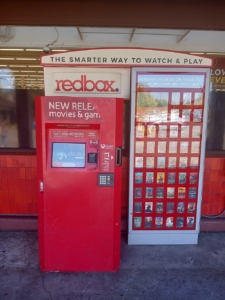Some of you reading this article are old enough to remember that there was such a thing as a video rental store. Those who don’t remember such businesses (or perhaps didn’t know such strange things existed) certainly knew of Redbox’s existence. But they may not have known that the parent company for this once booming business recently declared Chapter 7 Bankruptcy. It might be useful to see how this once-successful business didn’t go out with a bang, but with a whimper.
How It Started
There’s a lot to love about the Redbox startup story. It was initially developed in Chicago in the early 2000s as a simple 24/7 kiosk strategy for McDonald’s to provide a “vending machine” for fresh milk and other products. By 2004, McDonald’s had decided to use the kiosks to rent DVDs, and they implemented a “return anywhere” policy which means you could rent from one kiosk and return it at a different location, sometimes many miles away.
By 2005 Coinstar bought 47% of the company for $32M, a position they later increased to 51%, then the remaining 49% by early 2009. Traditional brick and mortar video rental stores were closing at a very high rate, but Redbox easily moved into existing retail locations like supermarkets and easily gained market share.
In 2009 Redbox dealt with a challenge from the studios, who wanted to put a 28-day waiting period on their movies going to Redbox to give a bigger boost to potential DVD sales. Redbox went to court, in the meantime buying the films at big box stores like other consumers, except they turned around and rented those films out. The legal tussle ended up positively for Redbox as it signed lucrative distribution deals with several studios for the rights to purchase and rent new-release films, and in the end, with both sides respecting each other a bit more, Redbox agreed to the 28-day period for some studios, a 7-day period for others.
By late 2010, the company hit its one billionth rental, and as of mid-2011, 68% of the US population was living within a five-minute drive of a Redbox kiosk. Those kiosks accounted for over a third of the disc rental market in the country. Later in 2011, Redbox added video game rentals. At its peak, in 2013, Redbox rented more than 770M items, accounting for 50% of DVD rentals in the US.
The Decline
By now you have guessed what arrived that ended the good times for Redbox: streaming. Widespread high-speed internet was necessary to lead this change, and by 2016 the parent company was shopping for a buyer. It ended up being sold, and Redbox was split out as a separate operating company.
In 2017 Redbox tried to get into the streaming market themselves which accounted for a brief bump in revenue, but instead of repurposing their kiosks and capitalizing on their brand, which didn’t only have to be associated with movies (they had already successfully extended to video games), they tried to go full into the movie business, underestimating just how much that would cost. Mistakes included:
- Acquiring the rights to an independent film for a 90-day release period, marketing the movie as the first “Redbox Original.”
- Forming a film and TV series production division called Redbox Entertainment
- Creating Redbox Free Live TV, an ad-supported streaming television service
Things only got worse, and by 2022 Chicken Soup for the Soul Entertainment (which operated Crackle and other online video ventures) acquired Redbox for $50M in stock and assumed $325M of Redbox’s debt.
The End
That huge debt had come from Redbox, due to a cash crunch, refusing to pay its bills. The new acquirer didn’t have free cash to acquire new movies, and a death spiral ensued. By June 2024 Chicken Soup for the Soul Entertainment filed for Chapter 11, amending to Chapter 7 the very next month. As of July 2024 Redbox’s online streaming and mobile app ceased functioning, but many of the remaining kiosks have been taken over by hobbyists who are keeping the machines going by using technical assistance available on the web.
Takeaways
It may be easy to play Monday-morning quarterback, but if Redbox had called us in 2013 at the height of its powers and asked what to do, here are some things we may have said:
- Most businesses don’t ever plan to be the “next big thing.” The minute you become that next big thing, you should be looking at when that run might end and sensible pivots that could be executed without major capital investment. Getting into the movie business was a stupid idea and the majority of their board should have known better.
- Technology changes every business. We always remind sellers that they need to talk about how technology might transform the business they are trying to sell so that buyers can better understand what they are getting into. The company renting more movies than anyone else should have seen that they couldn’t compete with streaming, which cut out the “trip to the store” behavior they had used for so long. They could have used their well-known and trusted brand to offer almost any other product other than the declining physical media that they defiantly kept pushing.
- Pay your bills. By the time the bankruptcy hit, CVS disclosed that it had not been paid any fees since 2002 and was owed over $420,000 in back payments. CVS had even canceled its deal with Redbox, but Redbox refused to remove their kiosks (to be fair, they didn’t have the money to fund those removals). Without proper cash flow, Redbox couldn’t add new movies, which only exacerbated their woes.
Alas, Chicken Soup ended up not being good for the Redbox soul.





